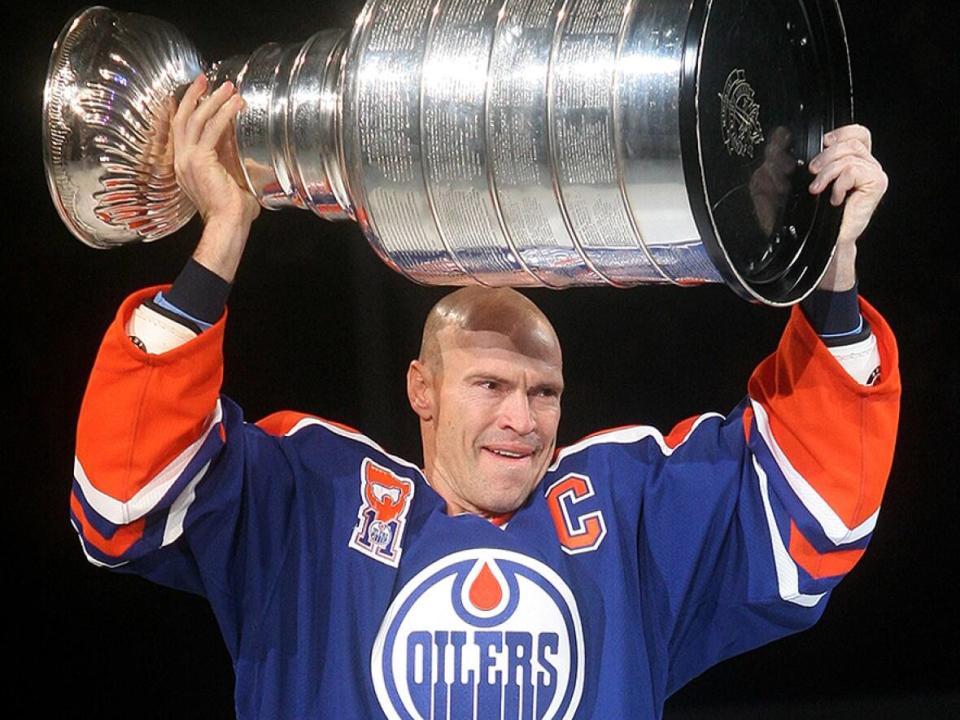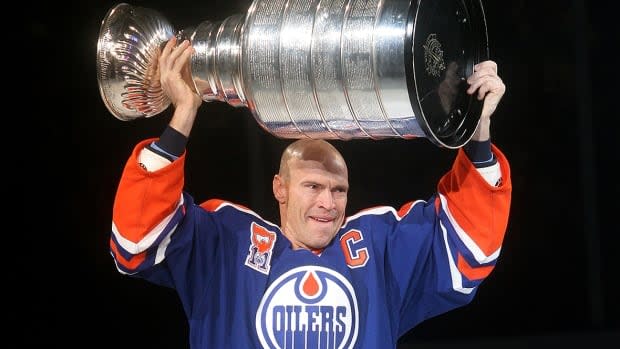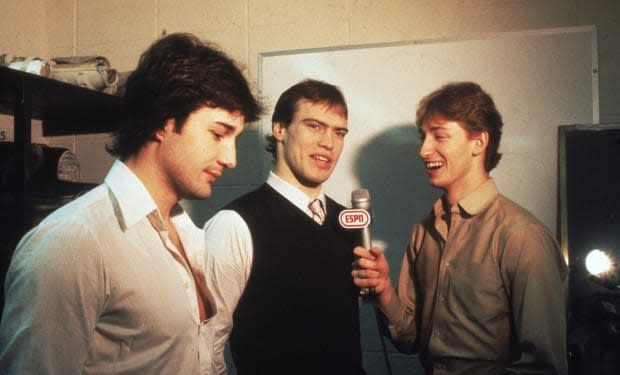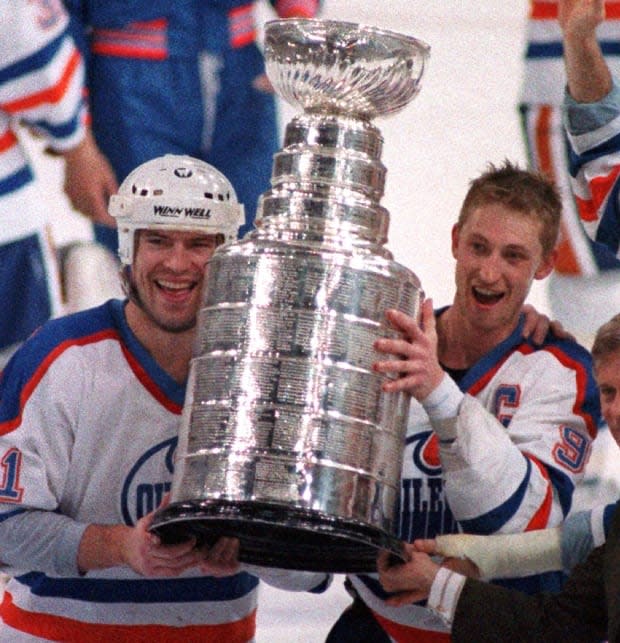Mark Messier on Gretzky, hockey fights, the NHL's new stars, and stickhandling success

Hockey superstar Mark Messier's new book, No One Wins Alone, blends the Hockey Hall of Famer's insights into achieving success as a player and a leader with his descriptions of a long NHL career that began when he was just 18 years old.
"Our first National Hockey League game was in Chicago Stadium, and when they played the national anthem with that organ and the crowd going crazy, we looked at each other, we couldn't think — we looked at each other and said wow, welcome to the NHL," Messier told CBC News.
Ian Hanomansing, co-host of CBC's The National, chatted with Messier about his memoir in an interview that ranged from The Great One (Messier's teammate Wayne Gretzky), to the Greatest (when the Oilers met Muhammad Ali), to Messier's take on leadership based on his experiences as the only NHL player to captain two different teams to Stanley Cup wins, Edmonton in 1990 and the New York Rangers in 1994.
These excerpts from the interview are condensed and edited.
Lessons and leadership
Messier says his approach to being a team captain was all about inclusion:
Messier: I think for me, myself, I recognized very early on that I wasn't the kind of player that could carry a team by myself. And I knew that if you wanted to win, it was going to be important to have everybody buying into the culture and the vision that's been created by the team and the players themselves.
I wanted everybody to feel a part of it, no matter what role they played on the team. And everybody has to feel that anything less than their best is not good enough.
It's the totality of the team effort that you rely on in order to win.

And timing, [it's] everything.
I was in a great position coming into Edmonton as an expansion team, playing with the greatest player on the planet, and rounding ourselves into a championship team. And then coming to New York and surprisingly being on a team with a tremendous amount of talent, and I was able to do something that hadn't been done in 54 years.
So timing is an important part of it, and surrounding yourself with people who are just as focused.
WATCH | What hockey superstar Mark Messier learned from his father, and about working with a team:
What made Gretzky great
Messier had a unique perspective on Wayne Gretzky, seeing him on the ice and in the dressing room from the time they were 18-year-old teammates. What does he think made Gretzky great?:
Messier: Well, I think the God-given talent that he was given, there's no question about it. He was born to be a hockey player in every way.
His will to win and be the best player ever was evident to everybody that was around him and played on the team with him. Very rarely in life can you look at a guy who's eight days younger than you and use him as an example from a leadership perspective.
On and off the ice, his focus was unparalleled.

He was in a completely different state of mind than I was at 18 years old. And I got the luxury of sitting across from the best player on the planet, maybe the best athlete in the last 100 years, and [to] look across at him and watch and learn from him. The way he approached the game, the way he prepared, his focus and dedication.
I would have been a fool not to look at him and take something from him, and he made me a better player. Not only from a skill standpoint, but from a preparation, commitment, focus standpoint as well.
WATCH | Mark Messier describes the Edmonton Oilers 'brotherhood':
Meeting The Greatest, Muhammad Ali
Messier recalls when the Oilers, on the verge of becoming one of the greatest teams in NHL history, met The Greatest, Muhammad Ali, on his 41st birthday at the boxer's home in Los Angeles:
Messier: It was crazy, Wayne got invited everywhere. It was quite a road show for a few years there. Everywhere we went, there were invites.
I grew up a big Ali fan, listening to his Frazier fights on the transistor radio. He was a real role model, a hero for me. It was remarkable to meet him and see him live in person. It just exceeded all expectations.
He was just so engaging, talking, he did magic tricks. It was like a one-hour entertainment show. He just carried the room, answered questions, had fun, made jokes. It was incredible, actually.
Meeting him gave me a sense that when someone meets you for the first time, this might be something you've done count less times in your lifetime but it's their first time, and to be mindful of that.
Hockey's evolution
The game has changed in many ways, including less fighting. Some retired players complain the NHL has become too soft. Messier's take?:
Messier: Well, I don't think so, I think the game is not soft.
I think the rules in some areas, they're soft, but the players aren't soft. And I think the rules overall have done a really good job in creating the electrifying speed that we're so accustomed to.
I didn't like the staged fighting ... but spontaneous fighting where two players are fighting for ice time and a test of wills collide and they settle it, [it's part of the game].

And so I think that's been good, the fighting is down and I think the entertainment value is up. I think the games are amazing.
I think one of the things I'm most proud of is through the COVID playoffs, without fans and the players, how hard they played. The games were incredibly entertaining, and they had to bear down — because of the passion and love they had for the game — to play without that excitement from the crowd which is a big part of our game.
And a lot of credit has to go to those players to play in those kinds of circumstances.
The NHL's current best
Asked who the second-best player he ever saw on the ice was after Gretzky, Messier's answer was quick: Pittsburgh's Mario Lemieux. And of the players who are currently in the NHL?:
Messier: I look at Sidney Crosby, who's been one of my favourite players since he came into the league. You know, the dynamic open-ice player that he is, but [also] probably the best corner man in the league. He plays down low, plays inside, plays in the paint — he could have played in any era. I love his dedication, his commitment, the way he's handled his career.
Patrick Kane [Chicago Black Hawks] is an amazing hockey player. Everybody would pay to watch him play.
And of course, now you've got Connor McDavid and Alex Ovechkin. You know, you can go through the rosters of most teams now and find incredibly, incredibly talented players that are exciting to watch.
WATCH | Why Mark Messier can't get away from hockey, even in retirement:
Do-overs and supporting young players
What does the 60-year-old Messier think of the 20-year-old version of himself?:
Messier: Well I don't think it's ever really good to go back and say you would have changed things. I think everything that happened in my life, or anybody's life, is what shapes you as a person.
Certainly as a hockey player, and certainly for me as a person off the ice, you know, I was just happy and fortunate to be around people that believed in me.
And for all the mistakes that I made early on, without the support from my family, without the support from the organization — there have been too many cases where players got buried and were never to be seen again. And that could have easily happened to me early on.

And I also think it's a lesson to make sure that we're not pushing players too fast when they come into this kind of environment. Especially teams that are positioning themselves to win and expecting too much from young players.
It's hard to be a pro.
There are a lot of expectations, there are a lot of things that you have to learn, there's a lot at stake for a lot of people — families, security, you know, people getting fired, losing jobs, families having to move cities and when you become a pro, a professional athlete. The decisions that you make directly affect the people around you, and I have a lot of respect for that now and certainly didn't make the right choices early on to reflect that.
Of course, everybody's different at their maturity level when they come into the National Hockey League, but I still think when they're 18 years old, they've still got some money, they're still having a good time, traveling around the world, playing hockey, doing something they love, but I don't know if they feel the gravity of what they're experiencing.
And what their decisions on and off the ice — the choices they're making — if they really kind of understand the gravity it has on people who are trying to keep their jobs.
Because if you're not winning, people are going to lose their jobs. And the decisions that you're making directly affect them.
What might have been
The Oilers won five Stanley Cups in seven years, but superstars like Gretzky and Paul Coffey were traded away when they were still in their 20s. Does Messier ever wonder how many Stanley Cups the team might have won had they remained in Edmonton?:
Messier: I guess thinking back and knowing how important depth was to our team's success, if we could have stayed together and replenished the depth on the team year after year, we could have won a few more championships, I'm sure.
Wouldn't have been easy, it never is easy. It might have looked easy from the outside, but I can tell you, it was really hard to win.
You can't look in the rearview mirror now and say what could have been, but it's nice to think about once in a while.
Watch full episodes of The National on CBC Gem, the CBC's streaming service.

 Yahoo Sports
Yahoo Sports 